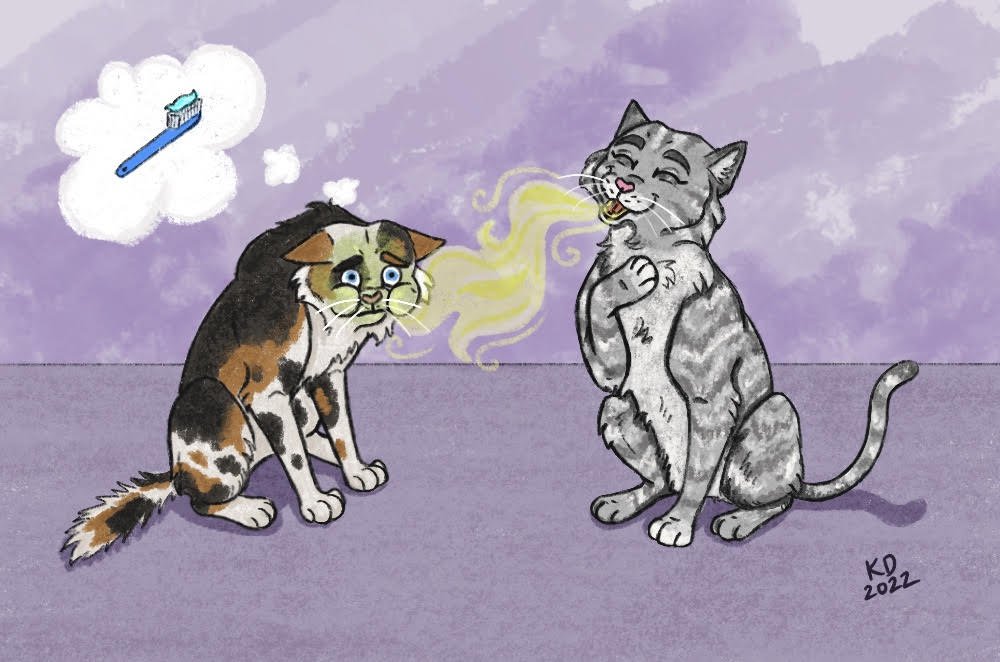Why Do Some Cats Have Bad Breath?
Have you ever had your cat sitting on your chest while you lay in bed or watch TV on the couch, and suddenly a waft of the worst possible breath floats past your nose? Does it seem worse than usual? Ever wonder what is causing your cat’s bad breath?
If a cat has bad breath there usually is a reason. Cat’s pride themselves on their ability to stay clean and remove any smells potential predators may be able to pick up on. This includes bad breath.
Their self-cleaning nature is more a feature of survival than it is a vanity, though as pet owners, it sure is convenient for us. So, what causes our cats to have pungent-smelling breath? After they eat, their breath is never a picnic, but it shouldn’t smell rotten a few hours after eating.
The answer is: it’s usually their teeth. Dental issues are the most common causes of bad breath in cats.
Periodontal Disease
The most common dental issue in cats is periodontal disease – an inflammation of the tissues surrounding the teeth. The inflammation is a bi-product of tartar and plaque buildup, which contain bacteria – bacteria that releases sulfur compounds causing a nasty smell.
Treating periodontal disease requires professional removal of the plaque and tartar, then regular upkeep once back at home.
Respiratory Virus
Respiratory viruses are pretty common in the feline world, and some of them can result in stinky breath. One virus, in particular, calicivirus, often results in ulceration of the tongue, which can cause a fairly bad smell. The positive side of it being a virus is that it will often run its course on its own without requiring medication, and once your cat heals, the smell goes away.
Tooth Root Abscess
Another common dental issue in cats, tooth root abscesses, is pretty serious. A bad abscess will cause a great deal of swelling around the particular tooth, with pus draining into the cat’s mouth (yuck) causing bad breath. These need to be lanced, and in many cases, the tooth extracted, with a brief diet of antibiotics to follow up.
Tumours in the Mouth
Mouth tumours may begin to grow in size, become infected, and decay. As you may have guessed, a smell can follow in these cases. Many oral tumours come with a poor prognosis. By the time they are causing issues, they are too far along, and treatment just isn’t possible.
Kidney Disease
As a cat’s kidneys begin to weaken in older age, their ability to filter toxins from the blood is reduced. When things get worse, and the bloodstream starts to contain more toxins, the smell of a cat’s breath can worsen. This is known as uremia. Cats with uremia often develop ulcers in the mouth which results in a negative smell.
Diabetes
Diabetes can affect a cat’s breath. This often skews the breath towards a more sweet smell, though the other signs of diabetes are often noticed before the change in breath. Things like increased thirst and appetite, increased urination, and weight loss, are often easier to spot before bad breath.
Final Thoughts
At the end of the day, it’s up to you to decide how far you are willing to go to protect your cat’s teeth. Not a lot of owners are willing to brush their cat’s teeth, but many cats would benefit from it. It’s usually easier to adapt an animal to a specific behaviour at a young age, so brushing from kitten age is ideal, as opposed to introducing it to an adult cat.
There are also some diets designed to reduce tartar and plaque buildup. Talk to your vet to determine what would work best for your cats!

